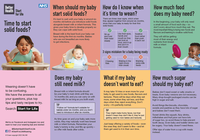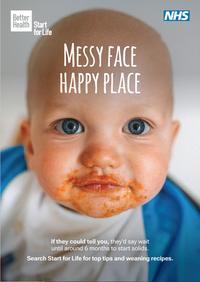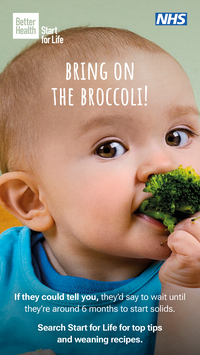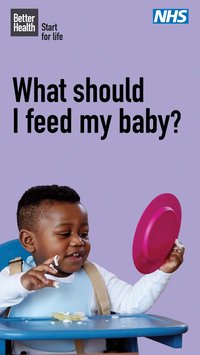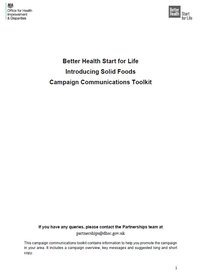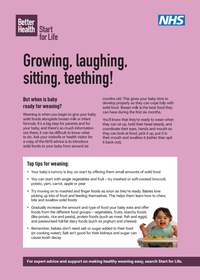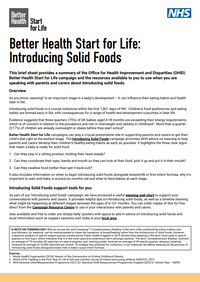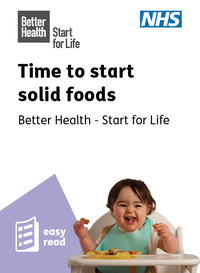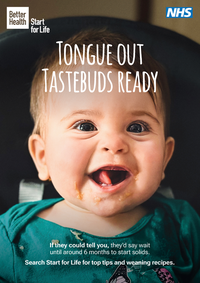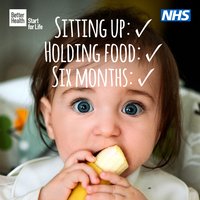Better Health Start for Life Introducing Solid Foods
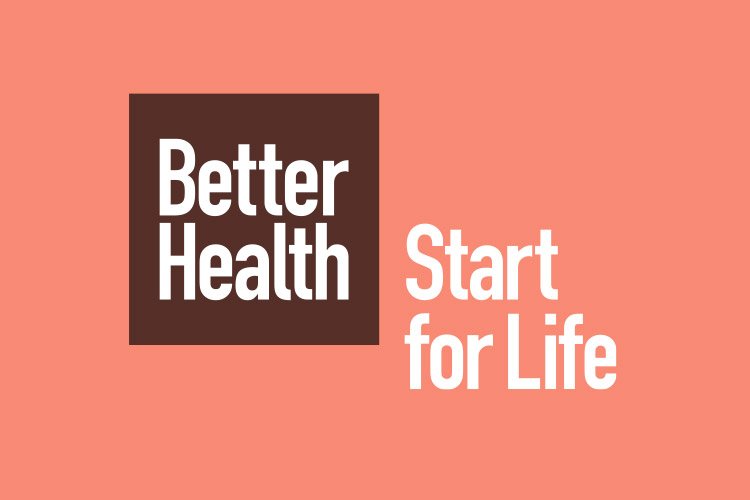
This campaign promotes waiting until your baby is around six months to introduce solid alongside breast milk or infant formula foods. At this stage, they need solid foods as well as- not as a replacement for- their usual breast milk or first infant formula (which is why its known as complementary feeding). Weaning teaches your baby how to move solid food around their mouth, chew and swallow solid foods.
We also
Campaign details
Related website
www.nhs.uk/start-for-life/
Target audience: Healthcare professionals, Parents and children
Topics: Early years
Campaign end date: Always on
Overview
On 13th February 2023, the Department of Health and Social Care will launch the Better Health Start for Life - Introducing Solid Foods campaign. The campaign will offer parents support and advice on introducing solid foods to their babies, helping to cut through misinformation and confusion through three easy to remember prompts:
- When to start introducing solid foods
- Why it’s so important to begin introducing solid foods at around 6 months
- What to feed their babies (easy, healthier recipes and guidance on textures and tastes) Introducing solid foods is a crucial milestone within the first 1,001 days of life. Children’s food preferences and eating habits are formed early in life, with consequences for a range of health and development outcomes in later life1. Official advice is that most babies should not start solid foods until they are around 6 months old, this gives them time to develop properly so they can cope with solid foods.
The campaign will promote waiting until your baby is around 6 months to introduce solid foods, alongside breast milk or infant formula. At this stage, they need solid foods as well as - not as a replacement for - their usual breast milk or first infant formula (which is why it’s known as complementary feeding). Introducing solid food teaches your baby how to move solid food around their mouth, chew and swallow solid foods.
As part of the campaign, the Start for Life Weaning Hub is available to help parents on their journey to introduce solid foods to their baby. Packed with NHS-endorsed advice, videos and tips, plus simple, healthy recipes, it puts everything parents need to know in one place.
Context to introducing solid foods
Children’s food preferences and eating habits are formed early in life with consequences for a range of health and development outcomes in later life. Evidence suggests that three-quarters (75%) of UK babies aged 4-18 months are exceeding their energy requirements, which is of concern in relation to the prevalence and risk of overweight and obesity in childhood2. With more than a quarter (27.7 per cent) of children already overweight or obese before they start school3, Better Health Start for Life campaigns play a crucial preventative role in supporting parents to get their child’s diet right at the earliest stage – when first introducing solid foods to their babies.
According to the World Health Organization, encouraging healthy food variety in children through repeated, positive exposure to new foods, seeing caregivers and family members enjoy healthy foods, and limiting their exposure to unhealthy foods (that may lead to preferences for very sweet foods and drinks), all help develop good food habits in children and their families4.
1 World Health Organisation (2016): Report of the Commission on Ending Childhood Obesity
2 SACN 2018: Feeding in the First Year of Life & Diet and nutrition survey of infants and young children (DNSIYC), 2011
3 NHS National Child Measurement Programme 2021/22: National Child Measurement Programme, England 2020/21 School Year - NDRS (digital.nhs.uk) 4 World Health Organisation (2016): Report of the Commission on Ending Childhood Obesity
Research for this campaign
An additional focus for this year's campaign is around the theme of confusion. New survey data of 1,000 parents with children aged 3 to 18 months shows:
- 3 in 5 (59%) first-time parents found the decision to start weaning confusing
- almost two-thirds (64%) have received conflicting advice on what age to start introducing solid food
- 2 in 5 (40%) of new mums have already introduced solid foods by the time their baby is 5 months old, even though experts recommend that solid food should be introduced from the age of 6 months
- after partners, grandmothers are the biggest influence on decision making with more than a quarter (28%) of first-time mums reporting their mother had the biggest influence on their decision to start weaning
- the majority (73%) agree there should be a single official source for weaning advice
Start for Life weaning hub
As part of the campaign, a weaning hub is available on the Better Health Start for Life website to help parents introduce solid foods to their baby. Packed with NHS-endorsed advice, videos and tips – plus simple, healthy recipes – it puts everything parents need to know in one place.
"Complementary feeding" is the term often preferred by policymakers and practitioners because weaning can be misinterpreted to mean the cessation of breastfeeding rather than the introduction of solid foods.
However, a keyword analysis of search engine queries conducted by OHID, illustrated that weaning is the term most used in search queries on this topic, indicating that this is the most commonly used and understood term among parents.
To mitigate any potential for confusion in our materials, we define weaning as the process of introducing solid foods alongside breast milk or baby's usual infant formula.
Information Service for Parents
We know that what happens during the first few years of life (starting in the womb) has lifelong effects on many aspects of health and wellbeing – from obesity, heart disease and mental wellbeing, to educational achievement and economic status. We also know that parental behaviours impact heavily on their child’s behaviours. Parents’ health can act as an enabler or barrier to nurturing their children’s development.
Research shows that becoming a parent presents an opportunity to provide information to support behaviour change, and that when looking for information and advice people want validated sources of authority, such as the NHS. This puts the Start for Life Information Service for Parents in a unique position within a very crowded market of pregnancy and parenting advice.
Start for Life Information Service for Parents is a universal offering, for all parents-to-be and parents of children up to four and a half years old. The service provides regular emails to the audience as their child reaches key milestones.
Start for Life has a particular focus on those from less socioeconomically privileged backgrounds, as we know that they are much less likely to be searching for and accessing reliable information on pregnancy and parenting. Healthcare professionals are also a target audience as they are a key channel for driving people to Start for Life services.
Related e-learning
A free bite-sized e-learning introduction to the best start in life including key evidence, data and signposting.
Published: 28 March 2022
